2016 YAMAHA XJR 1300 service
[x] Cancel search: servicePage 35 of 98
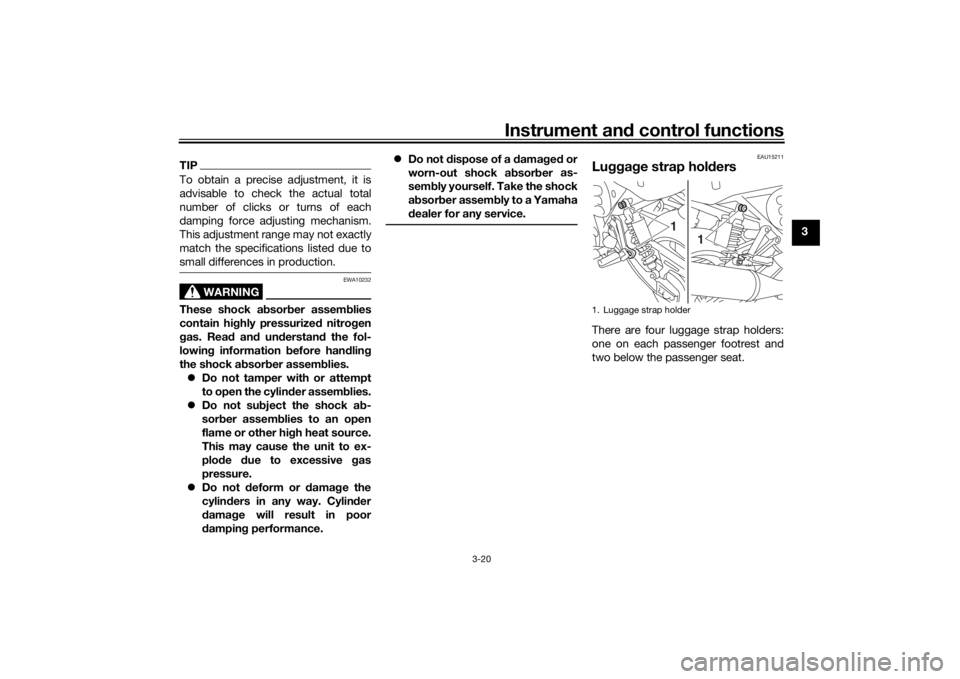
Instrument and control functions
3-20
3
TIPTo obtain a precise adjustment, it is
advisable to check the actual total
number of clicks or turns of each
damping force adjusting mechanism.
This adjustment range may not exactly
match the specifications listed due to
small differences in production.
WARNING
EWA10232
These shock ab sorber assem blies
contain hi ghly pressurize d nitro gen
g as. Rea d an d un derstan d the fol-
lowin g information before han dlin g
the shock ab sorber assem blies.
Do not tamper with or attempt
to open the cylin der assem blies.
Do not su bject the shock a b-
sor ber assem blies to an open
flame or other hi gh heat source.
This may cause the unit to ex-
plod e due to excessive gas
pressure.
Do not d eform or damag e the
cylin ders in any way. Cylin der
d amag e will result in poor
d ampin g performance.
Do not dispose of a d amaged or
worn-out shock ab sorber as-
se
m bly yourself. Take the shock
a b sor ber assem bly to a Yamaha
d ealer for any service.
EAU15211
Lu gga ge strap hol dersThere are four luggage strap holders:
one on each passenger footrest and
two below the passenger seat.1. Luggage strap holder
1
1
U2PNE1E0.book Page 20 Monday, December 28, 2015 11:03 AM
Page 46 of 98
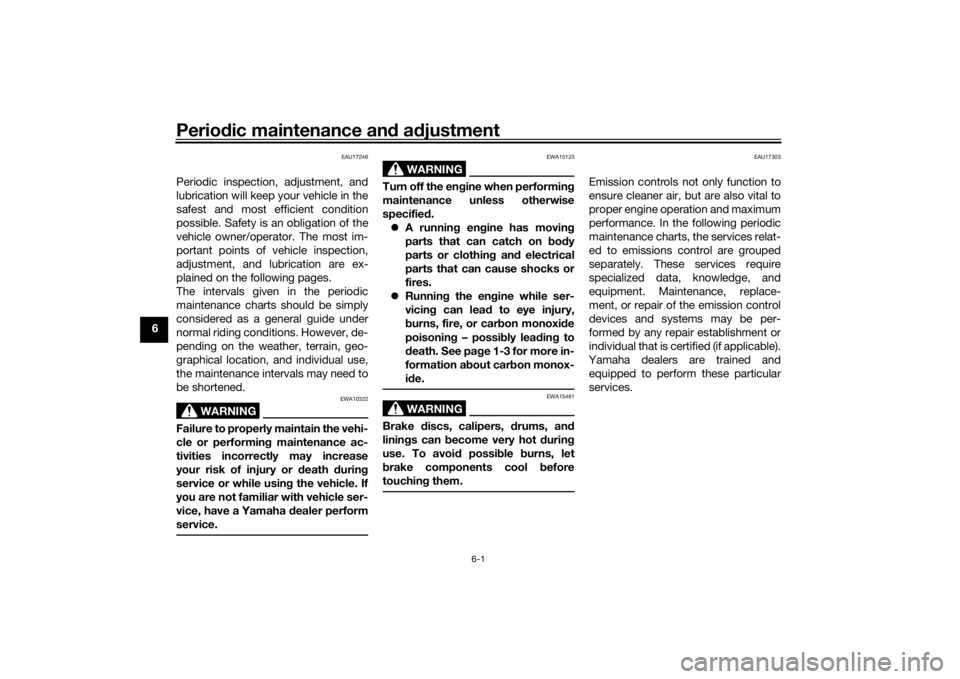
Periodic maintenance an d a djustment
6-1
6
EAU17246
Periodic inspection, adjustment, and
lubrication will keep your vehicle in the
safest and most efficient condition
possible. Safety is an obligation of the
vehicle owner/operator. The most im-
portant points of vehicle inspection,
adjustment, and lubrication are ex-
plained on the following pages.
The intervals given in the periodic
maintenance charts should be simply
considered as a general guide under
normal riding conditions. However, de-
pending on the weather, terrain, geo-
graphical location, and individual use,
the maintenance intervals may need to
be shortened.
WARNING
EWA10322
Failure to properly maintain the vehi-
cle or performin g maintenance ac-
tivities incorrectly may increase
your risk of injury or death durin g
service or while usin g the vehicle. If
you are not familiar with vehicle ser-
vice, have a Yamaha d ealer perform
service.
WARNING
EWA15123
Turn off the en gine when performin g
maintenance unless otherwise
specified .
A runnin g en gine has movin g
parts that can catch on body
parts or clothin g an d electrical
parts that can cause shocks or
fires.
Runnin g the en gine while ser-
vicin g can lead to eye injury,
b urns, fire, or car bon monoxi de
poisonin g – possi bly lea din g to
d eath. See pag e 1-3 for more in-
formation a bout car bon monox-
i d e.
WARNING
EWA15461
Brake discs, calipers, drums, and
linin gs can b ecome very hot d uring
use. To avoi d possi ble burns, let
b rake components cool before
touchin g them.
EAU17303
Emission controls not only function to
ensure cleaner air, but are also vital to
proper engine operation and maximum
performance. In the following periodic
maintenance charts, the services relat-
ed to emissions control are grouped
separately. These services require
specialized data, knowledge, and
equipment. Maintenance, replace-
ment, or repair of the emission control
devices and systems may be per-
formed by any repair establishment or
individual that is certified (if applicable).
Yamaha dealers are trained and equipped to perform these particular
services.
U2PNE1E0.book Page 1 Monday, December 28, 2015 11:03 AM
Page 47 of 98
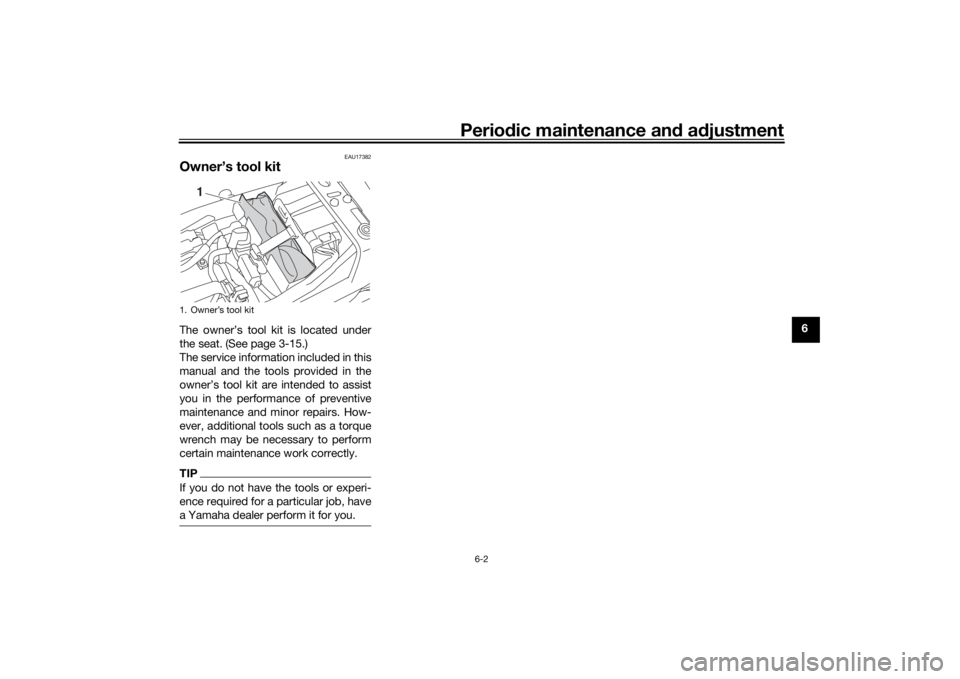
Periodic maintenance an d a djustment
6-2
6
EAU17382
Owner’s tool kitThe owner’s tool kit is located under
the seat. (See page 3-15.)
The service information included in this
manual and the tools provided in the
owner’s tool kit are intended to assist
you in the performance of preventive
maintenance and minor repairs. How-
ever, additional tools such as a torque
wrench may be necessary to perform
certain maintenance work correctly.TIPIf you do not have the tools or experi-
ence required for a particular job, have
a Yamaha dealer perform it for you.1. Owner’s tool kit
1
U2PNE1E0.book Page 2 Monday, December 28, 2015 11:03 AM
Page 52 of 98
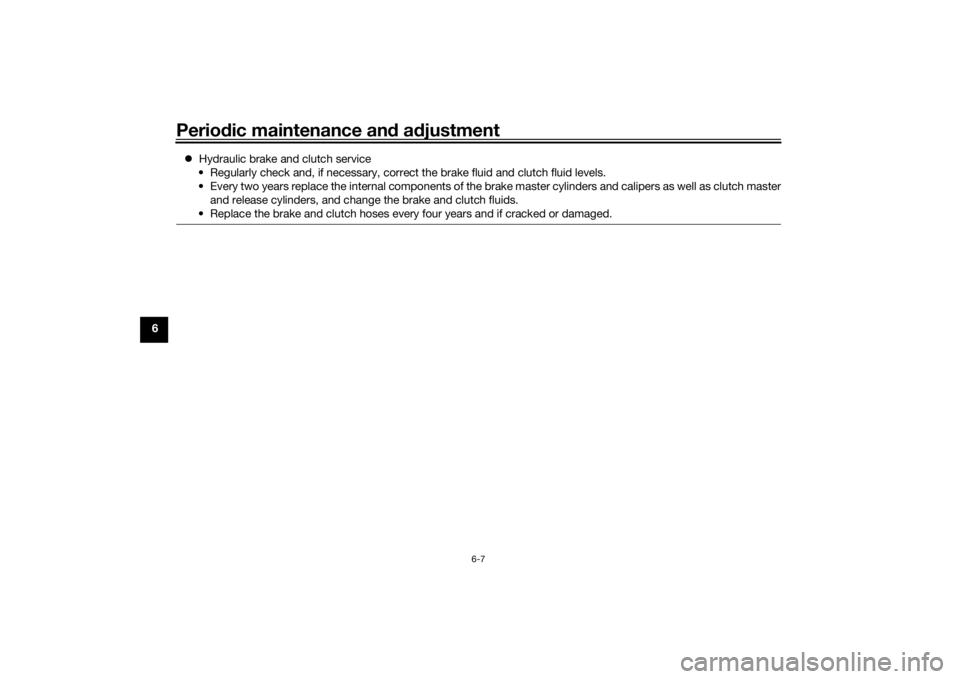
Periodic maintenance an d a djustment
6-7
6
Hydraulic brake and clutch service
• Regularly check and, if necessary, correct the brake fluid and clutch fluid levels.
• Every two years replace the internal components of the brake master cylinders and calipers as well as clutch master and release cylinders, and change the brake and clutch fluids.
• Replace the brake and clutch hoses every four years and if cracked or damaged.
U2PNE1E0.book Page 7 Monday, December 28, 2015 11:03 AM
Page 68 of 98
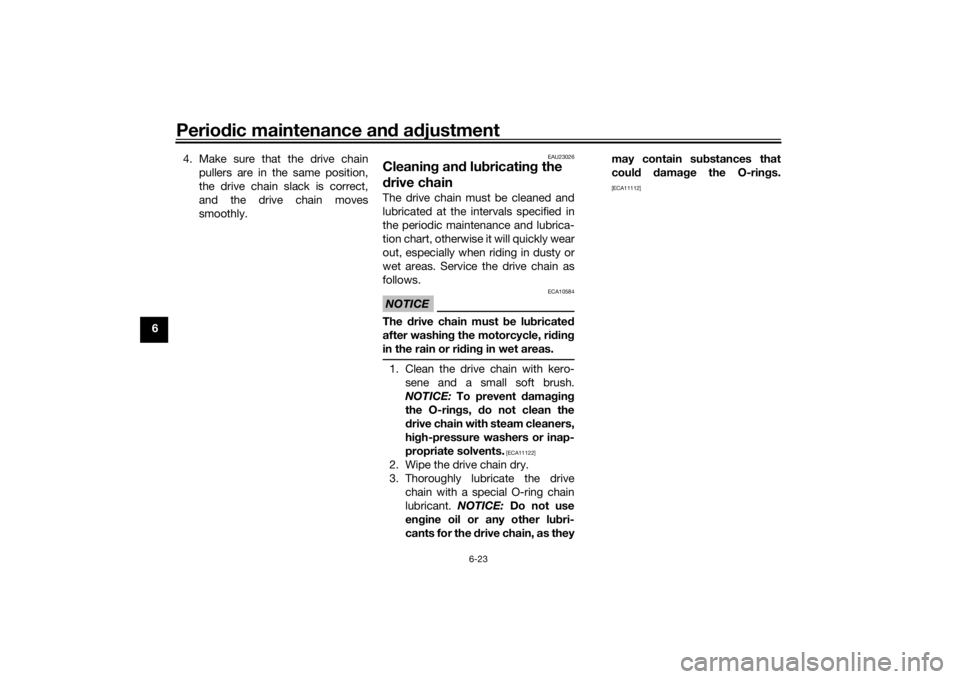
Periodic maintenance an d a djustment
6-23
6 4. Make sure that the drive chain
pullers are in the same position,
the drive chain slack is correct,
and the drive chain moves
smoothly.
EAU23026
Cleanin g an d lu bricatin g the
d rive chainThe drive chain must be cleaned and
lubricated at the intervals specified in
the periodic maintenance and lubrica-
tion chart, otherwise it will quickly wear
out, especially when riding in dusty or
wet areas. Service the drive chain as
follows.NOTICE
ECA10584
The drive chain must b e lubricated
after washin g the motorcycle, ri din g
in the rain or ri din g in wet areas.1. Clean the drive chain with kero-
sene and a small soft brush.
NOTICE: To prevent d amaging
the O-rin gs, do not clean the
d rive chain with steam cleaners,
hi gh-pressure washers or inap-
propriate solvents.
[ECA11122]
2. Wipe the drive chain dry.
3. Thoroughly lubricate the drive chain with a special O-ring chain
lubricant. NOTICE: Do not use
en gine oil or any other lu bri-
cants for the drive chain, as they may contain su
bstances that
coul d damag e the O-rin gs.
[ECA11112]
U2PNE1E0.book Page 23 Monday, December 28, 2015 11:03 AM
Page 80 of 98

Periodic maintenance an d a djustment
6-35
6
EAU24351
Supportin g the motorcycleSince this model is not equipped with a
centerstand, follow these precautions
when removing the front and rear
wheel or performing other mainte-
nance requiring the motorcycle to
stand upright. Check that the motorcy-
cle is in a stable and level position be-
fore starting any maintenance. A
strong wooden box can be placed un-
der the engine for added stability.
To service the front wheel
1. Stabilize the rear of the motorcy- cle by using a motorcycle stand
or, if an additional motorcycle
stand is not available, by placing a
jack under the frame in front of the
rear wheel.
2. Raise the front wheel off the ground by using a motorcycle
stand.
To service the rear wheel
Raise the rear wheel off the ground by
using a motorcycle stand or, if a motor-
cycle stand is not available, by placing a jack either under each side of the
frame in front of the rear wheel or under
each side of the swingarm.
EAU24361
Front wheel
EAU65461
To remove the front wheel
WARNING
EWA10822
To avoi
d injury, securely support the
vehicle so there is no dan ger of it
fallin g over.1. Loosen the front wheel axle pinch
bolt, then the wheel axle and the
brake caliper bolts.1. Brake caliper bolt
2. Front wheel axle pinch bolt
3. Wheel axle
3
2
1
U2PNE1E0.book Page 35 Monday, December 28, 2015 11:03 AM
Page 83 of 98

Periodic maintenance an d a djustment
6-38
6
8. Remove the brake caliper bracket
and the wheel.
To install the rear wheel 1. Place the wheel and the brake cal- iper bracket in the original posi-
tion.
2. Insert the wheel axle through the brake caliper bracket and wheel
from the right-hand side, and then
install the axle nut.
3. Install the drive chain onto the rear sprocket.
4. Connect the brake torque rod to the brake caliper bracket by in-
stalling the bolt and the nut.
5. Install the brake caliper by install- ing the bolts.
TIPMake sure that there is enough space
between the brake pads before install-
ing the brake caliper onto the brake
disc.6. Lower the rear wheel so that it ison the ground, and then put the
sidestand down.
7. Adjust the drive chain slack. (See page 6-22.) 8. Tighten the axle nut, brake caliper
bolts and brake torque rod nut to
the specified torques.
EAU25852
Trou bleshootin gAlthough Yamaha motorcycles receive
a thorough inspection before shipment
from the factory, trouble may occur
during operation. Any problem in the
fuel, compression, or ignition systems,
for example, can cause poor starting
and loss of power.
The following troubleshooting chart
represents a quick and easy procedure
for checking these vital systems your-
self. However, should your motorcycle
require any repair, take it to a Yamaha
dealer, whose skilled technicians have
the necessary tools, experience, and
know-how to service the motorcycle
properly.
Use only genuine Yamaha replace-
ment parts. Imitation parts may look
like Yamaha parts, but they are often
inferior, have a shorter service life and
can lead to expensive repair bills.
WARNING
EWA15142
When checkin g the fuel system, d o
not smoke, an d make sure there are
no open flames or sparks in the ar-
ea, inclu din g pilot li ghts from water
Ti ghtenin g torques:
Axle nut: 150 Nm (15 m·kgf, 108 ft·lbf)
Brake caliper bolt:
40 Nm (4.0 m·kgf, 29 ft·lbf)
Brake torque rod nut: 23 Nm (2.3 m·kgf, 17 ft·lbf)
U2PNE1E0.book Page 38 Monday, December 28, 2015 11:03 AM
Page 90 of 98

Specifications
8-1
8
Dimensions:Overall length:2190 mm (86.2 in)
Overall width:
820 mm (32.3 in)
Overall height: 1120 mm (44.1 in)
Seat height: 829 mm (32.6 in)
Wheelbase:
1500 mm (59.1 in)
Ground clearance: 133 mm (5.24 in)
Minimum turning radius: 2800 mm (110.2 in)Wei ght:Curb weight:
240 kg (529 lb)Engine:Engine type:
Air cooled 4-stroke, DOHC
Cylinder arrangement: Inline 4-cylinder
Displacement: 1251 cm³
Bore × stroke:
79.0 × 63.8 mm (3.11 × 2.51 in)
Compression ratio: 9.7 : 1
Starting system: Electric starter
Lubrication system:
Wet sump
Engine oil:Recommended brand:
YAMALUBE
Type:
SAE 10W-40
Recommended engine oil grade: API service SG type or higher, JASO
standard MA
Engine oil quantity: Without oil filter element replacement:
2.80 L (2.96 US qt, 2.46 Imp.qt)
With oil filter element replacement: 3.15 L (3.33 US qt, 2.77 Imp.qt)Air filter:Air filter element:
Oil-coated paper elementFuel:Recommended fuel:Premium unleaded gasoline (Gasohol (E10)
acceptable)
Fuel tank capacity: 14.5 L (3.83 US gal, 3.19 Imp.gal)
Fuel reserve amount:
3.1 L (0.82 US gal, 0.68 Imp.gal)Fuel injection:Throttle body:ID mark: 5UXB 10Spark plu g(s):Manufacturer/model:
NGK/DPR8EA-9
Spark plug gap: 0.8–0.9 mm (0.031–0.035 in)
Clutch:Clutch type:Wet, multiple-discTransmission:Primary reduction ratio:1.750 (98/56)
Final drive: Chain
Secondary reduction ratio:
2.235 (38/17)
Transmission type: Constant mesh 5-speed
Operation: Left foot operation
Gear ratio:
1st: 2.857 (40/14)
2nd:
2.000 (36/18)
3rd: 1.571 (33/21)
4th: 1.292 (31/24)
5th:
1.115 (29/26)Chassis:Frame type:Double cradle
Caster angle:
24.7 °
Trail: 92 mm (3.6 in)
U2PNE1E0.book Page 1 Monday, December 28, 2015 11:03 AM